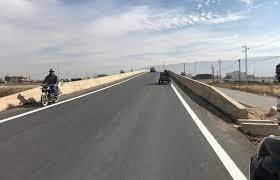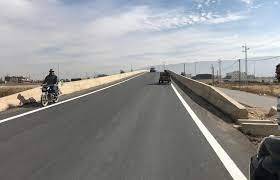The recent death of artist George Al-Rassi in a car accident is not an isolated incident; Lebanese citizens die daily on the roads, and it's not always due to speeding. Traffic safety in Lebanon is almost nonexistent, and much more is needed than just holding meetings and forming committees, as well as more than individual initiatives, no matter how important.
A new example of the chaos and neglect affecting Lebanon's roads is evident on the Arab Highway, particularly at the middle Bekaa detour, which poses a significant risk to the safety of all who traverse it. Although the highway operates in both directions, vehicles are predominantly using only one side due to a complete absence of guidance for drivers and traffic organization. This situation must be addressed by the Council for Development and Reconstruction, which executed this project and is responsible for monitoring it and making any necessary adjustments or repairs post-delivery. Otherwise, using this highway is akin to actual suicide, as it falls under the responsibility of the Ministry of Public Works and the Internal Security Forces.
Perhaps the Council for Development and Reconstruction needs to reconsider the entire Arab Highway project, which is still incomplete, by conducting a comprehensive survey and mitigating hazards for its users, as is the case in several locations, including the traffic detour towards the Dirj - Hamana, where the presence of a traffic divider is hardly noticeable just moments before reaching it.
Traffic safety is an issue that can no longer be postponed, despite the crisis and the high costs announced by Minister of Public Works Ali Hamieh, revealing that "the construction costs for 6,700 kilometers amount to 3.5 billion dollars, and the necessary maintenance is set at 3% of the construction cost, meaning that maintenance should total 105 million dollars, which translates to about 4 trillion Lebanese pounds at today’s exchange rate. Meanwhile, the current ministry budget amounts to 39 billion, equivalent to just 1 million dollars for the maintenance of all classified road sections." Therefore, what is the actual condition of Lebanon's roads, and what is required?
Traffic safety expert Kamal Ibrahim emphasized, through MTV, the necessity of not handing over any project if it is not completed or does not meet traffic safety standards, considering that "the main problem in Lebanon is not merely a lack of funding but rather the correct identification of the actual problem. We lack this diagnosis in Lebanon. The black spots on Lebanon's roads are outlined by scientific criteria and by specialists who possess the necessary expertise." He questioned, "Are these competencies in terms of traffic safety present in the Ministry of Public Works? Were projects delivered with traffic safety measures implemented? Unfortunately, many roads were handed over without these provisions, such as the road from Deir Znon - B’ar Elias - Riyaq, which has seen numerous fatalities due to traffic accidents." Ibrahim pointed out that these projects are the responsibility of the Ministry of Public Works if they are the executing body or the Council for Development and Reconstruction, revealing that contractors do not put up traffic signs or other safety standards because they do not yield profit; real profits come from asphalt and construction.
He continued, "The financial excuse might be convincing now, but we are currently paying the price for 20 years of a misguided understanding of traffic safety. When there was money, the approaches were incorrect, and now to solve the problem we must change our approach." Ibrahim emphasized that traffic safety requires a national strategic plan, as has been done in all countries around the world. He noted that traffic accidents result from a combination of factors, not just from roads or individuals' behavior. If we do not diagnose these factors accurately, the results will undoubtedly be negative.
Ibrahim called on the Ministry of Public Works to approach this issue scientifically, rather than following previous methods, determining black spots on Lebanon's roads scientifically and by experts; otherwise, we will continue implementing unsustainable, makeshift solutions. For example, one road might not need maintenance but rather requires speed management, which requires a specialist to assess based on criteria. So when will we begin actual treatment, far from wasting time in the corridors of committees that have long been stillborn in administrations and ministries?




